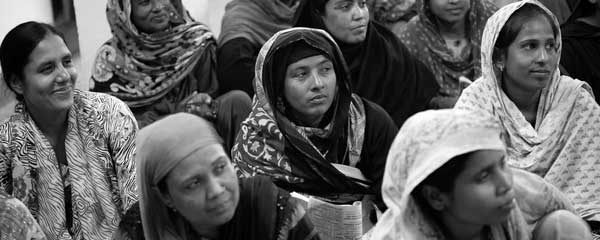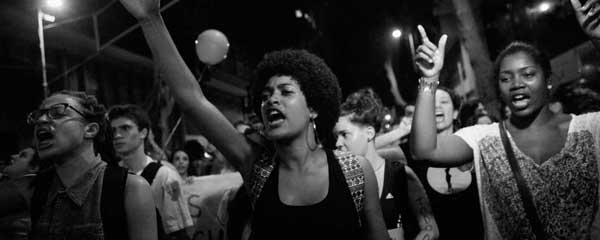
A conversation with Neli Esipova
Gallup's Regional Director for the World Poll in former Soviet states and Eastern Europe
What do you see as the No. 1 problem facing women in your region?
Esipova: Domestic violence. In many countries in my region, there are few laws on the books that protect women. Russia and Uzbekistan have no domestic violence laws. The number of shelters in these countries is minimal. Women don't even have places to hide and be safe.
In this region, women enter the workforce at the same level as men. You'd expect that they would get equal treatment elsewhere. Not in the home. Women have to juggle both; they raise children, take care of the family, and work. On top of this, some of them are being beaten. In Russia, for example, one woman dies from domestic violence every 40 minutes.
What do Gallup's World Poll data say about it? Are things getting better or worse?
Esipova: Domestic violence is something that people never talk about -- it's often viewed as a family matter, but everyone knows it is a problem. Both times we asked about it across the whole region -- in 2009 and again in 2015 -- majorities in nearly every country said domestic violence is a serious problem in their country. In 2015, majorities in 11 out of 14 countries said it is a serious problem.
| Serious problem | |||||||||||||||||||||||||||||||||||||||||||||||||||||||||||||||||||||||||||||||||||||||||||||||||||
|---|---|---|---|---|---|---|---|---|---|---|---|---|---|---|---|---|---|---|---|---|---|---|---|---|---|---|---|---|---|---|---|---|---|---|---|---|---|---|---|---|---|---|---|---|---|---|---|---|---|---|---|---|---|---|---|---|---|---|---|---|---|---|---|---|---|---|---|---|---|---|---|---|---|---|---|---|---|---|---|---|---|---|---|---|---|---|---|---|---|---|---|---|---|---|---|---|---|---|---|
| % | |||||||||||||||||||||||||||||||||||||||||||||||||||||||||||||||||||||||||||||||||||||||||||||||||||
| Lithuania | 78 | ||||||||||||||||||||||||||||||||||||||||||||||||||||||||||||||||||||||||||||||||||||||||||||||||||
| Georgia | 77 | ||||||||||||||||||||||||||||||||||||||||||||||||||||||||||||||||||||||||||||||||||||||||||||||||||
| Latvia | 73 | ||||||||||||||||||||||||||||||||||||||||||||||||||||||||||||||||||||||||||||||||||||||||||||||||||
| Kyrgyzstan | 73 | ||||||||||||||||||||||||||||||||||||||||||||||||||||||||||||||||||||||||||||||||||||||||||||||||||
| Moldova | 70 | ||||||||||||||||||||||||||||||||||||||||||||||||||||||||||||||||||||||||||||||||||||||||||||||||||
| Tajikistan | 70 | ||||||||||||||||||||||||||||||||||||||||||||||||||||||||||||||||||||||||||||||||||||||||||||||||||
| Armenia | 64 | ||||||||||||||||||||||||||||||||||||||||||||||||||||||||||||||||||||||||||||||||||||||||||||||||||
| Estonia | 64 | ||||||||||||||||||||||||||||||||||||||||||||||||||||||||||||||||||||||||||||||||||||||||||||||||||
| Russia | 58 | ||||||||||||||||||||||||||||||||||||||||||||||||||||||||||||||||||||||||||||||||||||||||||||||||||
| Ukraine | 56 | ||||||||||||||||||||||||||||||||||||||||||||||||||||||||||||||||||||||||||||||||||||||||||||||||||
| Belarus | 52 | ||||||||||||||||||||||||||||||||||||||||||||||||||||||||||||||||||||||||||||||||||||||||||||||||||
| Azerbaijan | 48 | ||||||||||||||||||||||||||||||||||||||||||||||||||||||||||||||||||||||||||||||||||||||||||||||||||
| Kazakhstan | 47 | ||||||||||||||||||||||||||||||||||||||||||||||||||||||||||||||||||||||||||||||||||||||||||||||||||
| Uzbekistan | 40 | ||||||||||||||||||||||||||||||||||||||||||||||||||||||||||||||||||||||||||||||||||||||||||||||||||
| Gallup World Poll, 2015 | |||||||||||||||||||||||||||||||||||||||||||||||||||||||||||||||||||||||||||||||||||||||||||||||||||
We asked this question again in Russia last year after Parliament reduced the punishment for assaults on spouses and children that do not result in serious injury. Two in every three Russians in 2017 said domestic violence is a serious problem. This is up from 58% in 2015 but similar to what we found in 2009. So, things are not getting better.
Is the situation getting better or worse in some countries than others? What are governments or nongovernmental organizations (NGOs) doing?
Esipova: There is still no developed system that protects women. It is mostly NGOs in the region that push for changes, and they face strong resistance from conservative groups who see these laws as interfering with families.
Late last year, Armenia finally passed a new law that makes domestic violence a crime and protects the victims. That leaves just Russia and Uzbekistan without domestic violence laws.
But for the most part, people across the entire region -- including Russians -- aren't very happy with their governments' efforts to fight the problem. In 2015, for example, majorities in Armenia, Ukraine, Moldova, Lithuania, Latvia and Russia said their governments are not doing enough to combat the problem.
| Yes | No | ||||||||||||||||||||||||||||||||||||||||||||||||||||||||||||||||||||||||||||||||||||||||||||||||||
|---|---|---|---|---|---|---|---|---|---|---|---|---|---|---|---|---|---|---|---|---|---|---|---|---|---|---|---|---|---|---|---|---|---|---|---|---|---|---|---|---|---|---|---|---|---|---|---|---|---|---|---|---|---|---|---|---|---|---|---|---|---|---|---|---|---|---|---|---|---|---|---|---|---|---|---|---|---|---|---|---|---|---|---|---|---|---|---|---|---|---|---|---|---|---|---|---|---|---|---|
| % | % | ||||||||||||||||||||||||||||||||||||||||||||||||||||||||||||||||||||||||||||||||||||||||||||||||||
| Uzbekistan | 87 | 7 | |||||||||||||||||||||||||||||||||||||||||||||||||||||||||||||||||||||||||||||||||||||||||||||||||
| Tajikistan | 85 | 7 | |||||||||||||||||||||||||||||||||||||||||||||||||||||||||||||||||||||||||||||||||||||||||||||||||
| Azerbaijan | 56 | 28 | |||||||||||||||||||||||||||||||||||||||||||||||||||||||||||||||||||||||||||||||||||||||||||||||||
| Kazakhstan | 49 | 28 | |||||||||||||||||||||||||||||||||||||||||||||||||||||||||||||||||||||||||||||||||||||||||||||||||
| Belarus | 46 | 34 | |||||||||||||||||||||||||||||||||||||||||||||||||||||||||||||||||||||||||||||||||||||||||||||||||
| Kyrgyzstan | 44 | 47 | |||||||||||||||||||||||||||||||||||||||||||||||||||||||||||||||||||||||||||||||||||||||||||||||||
| Georgia | 39 | 44 | |||||||||||||||||||||||||||||||||||||||||||||||||||||||||||||||||||||||||||||||||||||||||||||||||
| Armenia | 27 | 51 | |||||||||||||||||||||||||||||||||||||||||||||||||||||||||||||||||||||||||||||||||||||||||||||||||
| Estonia | 26 | 50 | |||||||||||||||||||||||||||||||||||||||||||||||||||||||||||||||||||||||||||||||||||||||||||||||||
| Lithuania | 26 | 59 | |||||||||||||||||||||||||||||||||||||||||||||||||||||||||||||||||||||||||||||||||||||||||||||||||
| Russia | 22 | 51 | |||||||||||||||||||||||||||||||||||||||||||||||||||||||||||||||||||||||||||||||||||||||||||||||||
| Moldova | 21 | 55 | |||||||||||||||||||||||||||||||||||||||||||||||||||||||||||||||||||||||||||||||||||||||||||||||||
| Latvia | 19 | 60 | |||||||||||||||||||||||||||||||||||||||||||||||||||||||||||||||||||||||||||||||||||||||||||||||||
| Ukraine | 11 | 58 | |||||||||||||||||||||||||||||||||||||||||||||||||||||||||||||||||||||||||||||||||||||||||||||||||
| Gallup World Poll, 2015 | |||||||||||||||||||||||||||||||||||||||||||||||||||||||||||||||||||||||||||||||||||||||||||||||||||
When we asked this question again in Russia in 2017, about half -- 47% -- said their government is not doing enough. Just 29% said their government is doing enough. The majority of Russian women do not think their government is doing enough -- they are more likely than men to feel this way.
We also repeated a question from 2009 asking what should be done in a hypothetical situation in which a man regularly beats his wife and children and the wife reports the violence to the police. Two in three Russians say the man should be forcibly evicted from the home -- the same as in 2009. But the 13% who say the man should keep living in the home increased from 5%.
Do you ever think something like the #MeToo movement that was highly publicized in the United States could happen in your region?
Esipova: It already has in some countries. Before #MeToo spread in the U.S., there was the #IamNotAfraidtoSay movement, under which thousands of Russian and Ukrainian women posted their stories of harassment and domestic violence on social media. But in Russia, lawmakers have been pretty dismissive about it. One Parliament member said recently that if a woman doesn't want attention, nobody will harass her.
Find out more about Gallup's World Poll and its research in former Soviet states and Eastern Europe.




